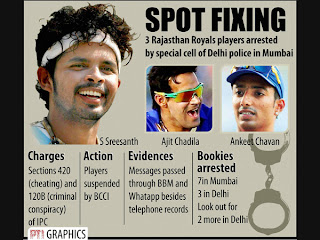By Faizaan Qureishi / Mumbai
Players facing allegations of spot-fixing, Sahara quitting the league while accusing the BCCI of unsportsmanlike conduct, A CSK official being called for questioning over his betting links, rumours of a big-ticket sponsor considering pulling out… the IPL is facing its biggest credibility crisis yet.
So while it is almost laughable to consider, the BCCI had plans to discuss the addition of a tenth team at the end of this season (with Sahara’s withdrawal, it would be a ninth team). But just who would want to be part of a league that is facing so many challenges on so many fronts?
“Anyone who has a corporate reputation to protect would stay away,” Santosh Desai, brand analyst and managing director of Future Brands, told INN. “It is very difficult to see a blue chip company being interested.”
The original blueprint for the league called for two new teams to be added to the original eight after the first three years. The sale of the Pune and Kochi franchises for a total of $703 million in 2010 was hailed as evidence of the league’s undoubted success.
Today, neither of those teams exist and the board theoretically stands to lose over $500 million as a result. The IPL also lost a third team when the Deccan Chronicle group was unable to keep paying the franchise fee. The team was sold to the Sun Group for Rs 425 crore, double the value paid by the Deccan Group, but a far cry from the sum of approximately Rs 1700 crore Sahara paid.
Desai points out that the league was imagined in better times and now sticking to the original script is stupid. “Does the IPL need ten teams? That is far from being the case.” He was also critical of the IPL’s network of entrenched interests, with everyone wanting to protect their own turf. “Sony Max did not discuss the scandal at all [on its pre-game show]. It did not even refer to it”
The addition of Pepsi as title sponsor in 2013 then became the battle cry to show that all was well with the IPL. Pepsi not only doubled-up on what DLF paid for the first five years, but also added a sheen of legitimacy to the tournament.
But now even Pepsi is reportedly re-evaluating whether it wants to continue with the league, though the company has said it has not had any official communication with the board.
“Sponsors who have their own reputation and stakeholder relationships to protect will fight shy of IPL eventually,” Unni Krishnan, the managing director of Brand Finance, which values the IPL’s brand every year, said. “Marketing experts and advertisers will do well to recall that the Lance Armstrong model of brand building only ends in tears.”
To be sure, this does not mean that nobody would be interested in buying a team. While television viewership has been declining over the last few years, the stadiums remain packed and the league still offers plenty of visibility.
“Take CSK. If you look at the India Cement logo on the back of the jerseys, India Cements as an entity to a large extent has been established by CSK,” Sridhar Ramanujam, the head of brand consulting firm Brand Comm, said. “No doubt [he league] has some value.”
However, both Desai and Sridhar think that an IPL franchise is not a good commercial opportunity. There is little room to make money – Sahara stands to save Rs 400 crore annually by withdrawing from the IPL and ending its sponsorship of the Indian team.
There is also the “headache and heartburn” that comes with dealing with the board that needs to be considered as well, which is why it is hard to see an established corporate house like the Tatas or the Birlas showing interest in a team.
According to Sridhar, it is “the clout that you get; the media visibility” that is the attraction.” That is why is more likely that a new generation entrepreneur who has a lot of cash – someone perhaps in real estate or infrastructure – that would be interested. In other words, someone who wants to ride on the coattails of the IPL’s profile to raise his or her own.
Of course, this depends on how the current controversies play out and whether the BCCI and the league can clean up their act.
“IPL’s stewards seem to exhibit classical symptoms of ‘Willful Blindness’, not wishing to see the writing on the wall,” Krishnan said. “As long as the proponents of this theory hold fast to this world view, IPL is doomed to extinguish itself by its own misdeeds.

